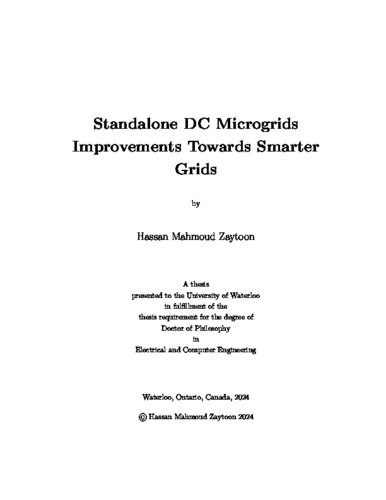| dc.description.abstract | Traditional distribution power systems are facing tremendous challenges in ensuring reliable and secure operation of the energy systems because of the new trend of using small- scale power generation and the proliferation of new types of loads such as electric vehicles.
Microgrids have emerged as a promising solution to address the challenges posed by the growing demand for clean and reliable energy. Microgrids are self-sustaining, small-scale power networks, independent of centralized power plants. They offer numerous advantages including enhanced reliability, resiliency, cleaner energy, and economic development.
Microgrids are designed to collaborate with Distributed Generation (DG) sources such as Photovoltaic (PV) panels, wind turbines, Energy Storage System (ESS), and small-scale generators. These energy sources are more environmentally friendly than traditional units.
Microgrids can be either AC or DC grid systems. DC microgrids have gained significant attention as they offer remarkable benefits compared to their traditional AC counterparts. DC microgrids offer higher efficiency, improved integration of renewable Distributed Generations (DGs), precise power control, and reduced infrastructure costs compared to AC microgrids. It is clearly obvious that the majority of renewable DGs and ESS produce DC energy which is converted back to AC in order to be connected to the traditional AC grids. Likewise, a considerable portion of modern loads utilize DC power like Variable Frequency Drives (VFD), Electric vehicles (EVs), and electronic-based loads. Despite the considerable interest in DC microgrids, there remain several control and protection challenges that must be addressed to ensure their safe and reliable operation for widespread deployment. Preserving load-generation balance is comprehensively challenging because of the existence of a large number of integrated DGs, ESS, and loads with various technologies. The intermittent power profiles and different capacities of DGs add an extra dimension of complexity to these challenges. Remote and Islanded DC microgrid control is more challenging due to the lack of support from the main grid. As a result, it requires sophisticated control algorithms to ensure the system’s stability. Moreover, due to the nature of DC power flow, DC microgrids are facing extremely high fault currents with no zero crossing. In order to address this fault current issue, it is essential to have an effective high-speed protection system to handle these current and interrupting faulted sections rapidly and safely.
Smart grid concept seems as perfect solution for the growing problem of complex microgrid operation. Smart grid entails sophisticated digital automation and intelligent management, which are well suited to solve microgrid operational problems. The current proliferation of DGs and ESS has made modern microgrids more interactive than their predecessors. However, the advent of information technology, and modern communication systems have provided opportunities for automated energy management. By integrating sensors and electronic converters into the energy sources and connecting them to a cloud-based repository of real-time data, a smart system can optimize price, reliability, and the utilization of clean energy based on the available parameters. However, communication networks in smart grids bring increased connectivity at the cost of increased security vulnerabilities. A smart grid can be a prime target for cyber threats due to its critical nature and structure.
Driven by the aforementioned challenges, the broad goal of this thesis is to address the DC microgrids challenges for the sake of the implementation of safe and reliable DC-based smart grids. Firstly, a multi-layer hierarchical control system is proposed. An improved convergence speed Improved Adaptive Model Predictive Controller (IAMPC) is proposed as a primary controller that aims at ensuring optimum, reliable, and extended lifetime operation of the integrated DGs, ESS, and loads. Moreover, an investigation is conducted to assess the robustness of the proposed IAMPC under parameter variations and system degradation. Secondly, a cooperative distributed consensus-based secondary control strategy is proposed ensuring a global voltage regulation and optimum load sharing among the distributed DGs and/or clusters. To address protection challenges in DC microgrids, thirdly, a novel relay protection system is proposed for detecting, identifying, locating, and isolating various faults. The proposed system ensures optimum sensitivity for a wide range of bolted faults and high-resistance faults taking into account the microgrid dynamics during the fault period, the grounding configuration, grounding resistance, and fault resistance. The proposed protection system is capable of clearing faults in less than one resonant cycle while redistributing the load sharing among the updated available generating units. | en |

